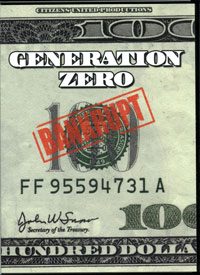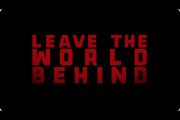
While I certainly look back with fondness on the “Greatest Generation,” I can’t help but think that the superlative applied to it may be unwarranted. They did weather the Great Depression and defeat the National Socialists, but they also greatly empowered international socialists. These would be people such as Franklin Delano Roosevelt, who gave the big-government ball American history’s hardest push and made constitutional trespass an art form. And then there is something else: If we believe the truest measure of a person is how he raises his children, we should note that WWII-era Americans gave us Generation Zero.
This is a term coined by those who gave us the new documentary Generation Zero. Produced by David Bossie of Citizens United Productions and directed by Stephen Bannon, the work examines the causes of our financial crisis. But it is no plain-vanilla, statistics-addled snoozefest, as it looks beyond the usual one-dimensional political and economic explanations to that deeper realm: the moral. And, as its title suggests, its makers place the blame for the crisis squarely on the shoulders of the Baby Boomer generation — or, should I say, degeneration — which shed tradition and virtue at a rate theretofore unseen in American history.
Boots, Sandals, and Oxfords
I’m not sure if the work’s title is a reference to the communist Khmer Rouge’s “Year Zero” — which was part of their effort to wipe away the past and start history anew — but it is clear that, like so many others, the documentarians identify the 1960s as a seminal period in our history. Here is their theory in a nutshell: After going to Hell and back, the WWII generation wanted to finally leave the misery behind and enjoy a white-picket-fence lifestyle. More to the point, they didn’t want their children to suffer as they had. The result was that they overindulged them and pampered them, denying them that character-building baptism of fire. But an idle mind is the Devil’s playground, and when these children came of age, they became the hippies at Woodstock, with flowers in their hair and airy philosophies in their heads.
Although this is the basic thesis, Generation Zero goes beyond it and examines the micro as well, presenting commentary from a wide array of experts. Some of the notables are Michael Barone, Newt Gingrich, Michael Novak, Victor Davis Hanson, Shelby Steele, Myron Magnet, Dr. David Kaiser, Dr. Arthur Brooks, John Fund, Lou Dobbs, and Ambassador John Bolton.
There is no doubt that some reading this will be turned off by the documentary’s apparent neocon pedigree, but I would caution against rash judgment. As I indicated, this is not a shallow work; it is also honest and addresses many deep-seated problems generally ignored by the mainstream media. It talks about the Cloward and Piven strategy of trying to destroy the “capitalist” system by collapsing it through the creation of excessive regulation and entitlements; the belief that FDR’s spending didn’t mitigate the Great Depression but exacerbated it; the false notion that deregulation led to the financial crisis; the capitalization of profits and nationalization of losses; the consequences of printing excess money; the “Bear Stearns Exemption,” which allowed that company and any larger than it almost unlimited leverage; the deindustrialization of America because of suicidal trade agreements; the Community Reinvestment Act; and the “financial death spiral” facing the United States due to mounting debt. The documentary also savages the toxic marriage between Uncle Sam and Wall Street, which enables the well-connected to “game” the system, and in doing so the documentarians spare neither major party. In fact, in this the work sounds a lot like Ron Paul, who has lamented the “Corporatism” of Obama and Co.
Generation Zero also shines in terms of artistry. It weaves together ominous music, interesting imagery symbolizing what is being discussed at the moment, and clever metaphors and analogies to create a work that, although fairly deep, is fast-paced and engaging. It angers you by revealing the middle-class-rending blend of big government and big business with a pleasant blend of style and substance.
Since I can’t resist adding my own two cents (devalued to one and a half by the time this is published, no doubt), I’ll address a criticism the documentary has received. Some scoff at the notion that sandal-wearing, tie-dyed hippies became today’s infamous Wall Street sharks; they claim that the latter were more likely the tie-wearing Leave It to Beaver types. First, it should be reiterated that the problem is that we have sharks in government showing professional courtesy to their fellow predators. Yet the transition from hippie to yuppie isn’t hard to fathom.
Archbishop Fulton J. Sheen once said, “He who marries the spirit of the age will be a widower in the next.” Sure, indulging youthful passions (free sex, drugs) feels great during one’s salad days, but as the Bible states, “There is pleasure in sin for a season.” With age and diminishing libidos that season changes, and then what “feels” best? Well, psychologists have noted that as people grow older, their focus shifts from sex to financial security. And since these moderns are moral relativists who, divorced from Truth, only have their emotions to use as a yardstick for determining behavior, is it any surprise that they would become rapacious robber barons when their desire for conquest shifted from women to wallets?
Seasons Under the Sun
Speaking of seasons, Generation Zero warns that we face a very cold winter: a fourth turning. This refers to a theory of civilizational cycles presented in The Fourth Turning, a book by William Strauss and Neil Howe. The theory states that the cycles, which the authors call “turnings,” are in fact like seasons. There are four of them: the High, the Awakening, the Unraveling, and the Crisis. Each lasts about 20 years, giving us a cycle of 80 to 100 years.
The Crisis is a catastrophic event, such as WWII. If the civilization survives it, it is followed by the High, which is a period of consolidation; we saw this in the 1950s, where people wanted that Ozzie-and-Harriet lifestyle and their children to never have to endure their troubles. This period is marked by a high birthrate and the creation of much infrastructure but also by the death of emotional life. Next comes the Awakening, where the children of the High become young adults in an era of great change, where tradition is questioned. This leads to the Unraveling, during which the High’s values come under greater assault, financial speculation increases, and boom and bust cycles become more violent. The documentary states that this is the phase we are in, and that our times are reminiscent of the 1920s, 1850s, and 1760s. (It’s that infamous repetition of history.) This thrusts us back into a fourth turning, the Crisis. It’s a dangerous time, of course, where a civilization can sink or swim. If the latter, a fourth turning can become a new “founding moment” for our nation. The American Revolution, of course, was a fourth turning, as was the War Between the States and WWII.
But while mankind certainly does cycle, I would add some nuance. Note that while we have those weather patterns called seasons, we also have 1,500-year cycles of warming and cooling, and 100,000-year glacial periods interrupted by 12,000-year interglacials, among the ebb and flow of climatic life on this blue orb. Similarly, while I don’t doubt the “turnings” theory, it describes a cycle that is merely embedded in one or more larger cycles. Thus, the theory as presented in the documentary (perhaps Strauss and Howe provided more nuance in their book) ignores much. For one thing, we know that a civilization is much like a person, in that it has a life cycle: It’s born, grows and becomes stronger, plateaus, and then declines and dies. Clearly, a civilization will always have a fourth turning that will be its last.
I also disagree with the documentary’s claim that we always emerged stronger from our previous fourth turnings. It’s more correct to say that we emerged better in some ways but not in others. For example, while the War Between the States brought an end to the heinous practice of slavery, it also planted the seeds for the evisceration of the 10th Amendment and the enslavement of the states to the feds. While we emerged from WWII with a booming economy, Generation Zero’s indictment of the flower children and talk of a dying “emotional life” indicates that child-rearing was a bust. So while I was left with the impression that survival of a fourth turning was akin to rebooting a computer and emerging with an updated version of the old “settings,” it is more as if each first turning apart from the initial one starts with a “down-dated” version of the software: 7.0, 6.0, 5.0, 4.0… and when you reach the real zero, the detonation is the end of Rome.
The point is that the first-turners after 1865 were very different from those living in the wake of the American Revolution — and the ones after WWII were very, very different from both. They all worshipped different spirits of the age.
This will always be the case unless society asks, and answers, that all-important question: What is Truth? As long as we’re awash in moral relativism, unmoored from the unchanging, we’ll ultimately have no guide for behavior except “If it feels good, do it.” And then we’ll always swing from one extreme to another, one mistake to another, and crises will be our lot. The real turning we need is a turning to God.
But this is hardly a criticism of Generation Zero, as it is probably the best work on the financial crisis in existence. If we don’t diagnose our woes correctly, we cannot prescribe the proper cure. Generation Zero renders a very accurate diagnosis and is bold enough to prescribe the bitter pill. It is a great antidote to the crisis that is intensifying our Crisis: the mainstream-media crisis of misinformation. It is a must-see for all Americans.



